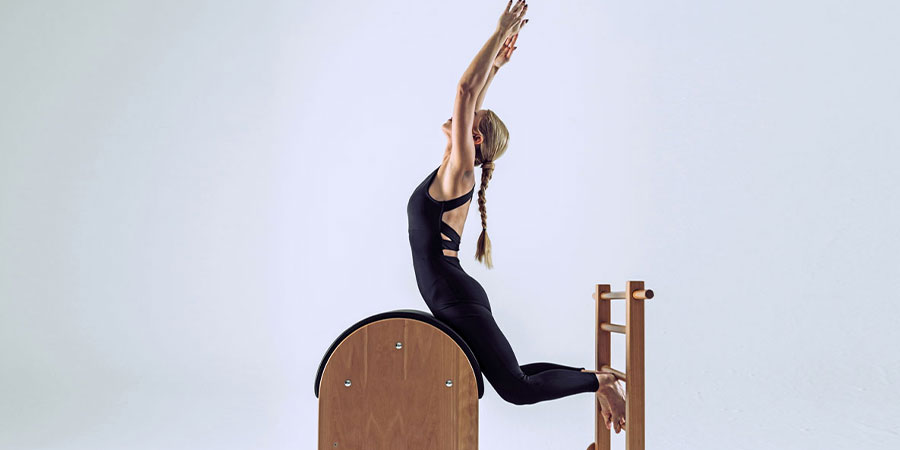Pilates is often recommended as a form of exercise for people with back pain, as it can help improve spinal alignment and reduce stress on the lower back.
Back pain is a common condition that affects millions of people worldwide. Here are some statistics about back pain and Pilates:
- According to the World Health Organization (WHO), back pain is one of the leading causes of disability worldwide, with an estimated prevalence of up to 70% in industrialized countries.
- A study published in the Journal of Orthopaedic & Sports Physical Therapy found that Pilates can be an effective treatment for low back pain, with participants experiencing significant improvements in pain, function, and quality of life.
- A systematic review of Pilates for low back pain published in the journal BMC Musculoskeletal Disorders found that Pilates-based exercises were effective in reducing pain and disability in people with chronic low back pain.
- A survey conducted by the Balanced Body Education Program found that Pilates instructors report seeing a significant number of clients with back pain, and that Pilates exercises are effective in reducing back pain symptoms.
- A study published in the Journal of Back and Musculoskeletal Rehabilitation found that Pilates exercises on the reformer were effective in reducing disability and improving quality of life in people with chronic low back pain.
Overall, there is growing evidence to support the use of Pilates exercises as an effective treatment for back pain. However, it’s important to consult with a healthcare provider before starting a new exercise program, especially if you have back pain. A Pilates instructor with experience working with clients with back pain can also help you determine the appropriate exercises and modifications for your individual needs and level of fitness.
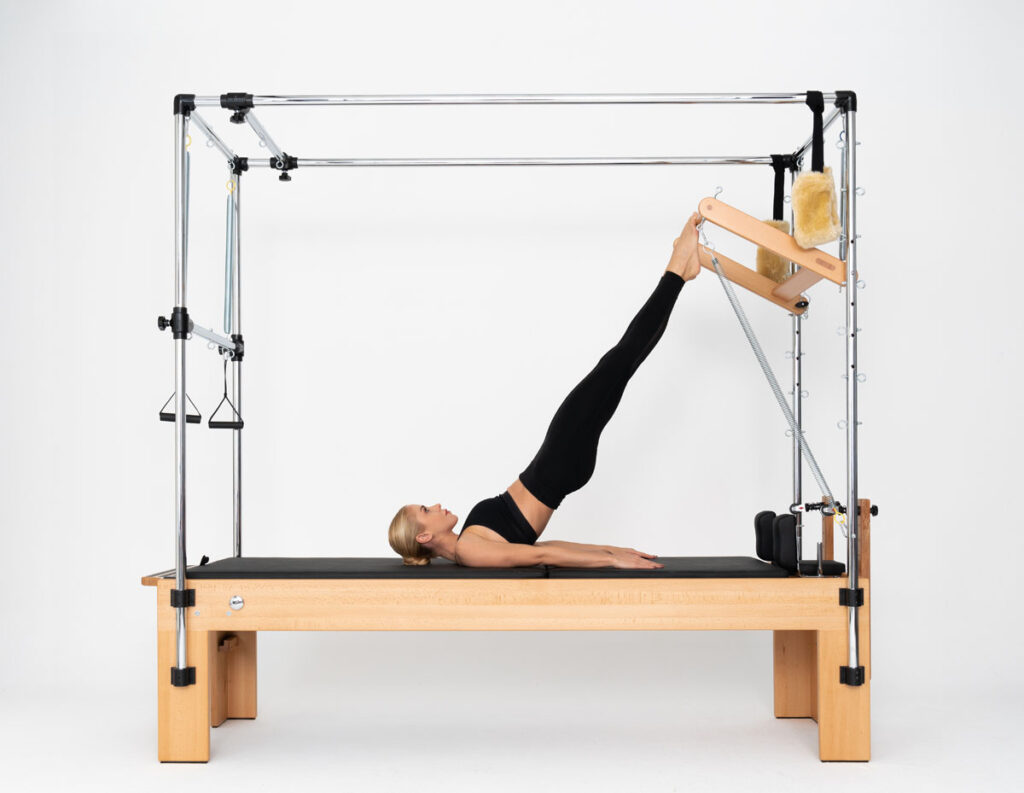
There are several Pilates accessories that can be helpful for people with back pain. Here are a few examples:
Pilates Mat: A good quality Pilates mat can provide extra cushioning and support for your back while performing exercises on the floor. Look for a mat that is thick enough to provide adequate cushioning, but not too thick that it interferes with your balance or stability.
Pilates Magic Circle: The Pilates Magic Circle, also known as a Pilates ring, is a small resistance ring that can be used to add extra resistance to exercises and help engage the muscles of the back and core. It can also be used to provide additional support for the arms during exercises that require you to lift them off the ground.
Foam Roller: A foam roller can be used to perform myofascial release exercises, which can help release tight muscles in the back and promote better circulation. Foam rolling can also be used to improve posture and spinal alignment.
Pilates Ball: A Pilates ball can be used to add extra resistance to exercises and help engage the muscles of the back and core. It can also be used to provide additional support for the arms and legs during exercises that require you to lift them off the ground.
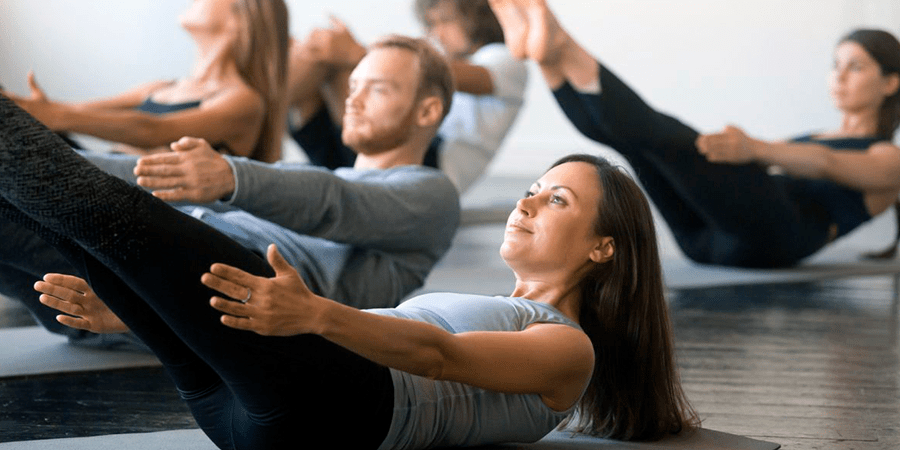
Here are some Pilates Mat exercises that can be beneficial for people experiencing back pain:
Pelvic Tilt: Lie on your back with your knees bent and your feet flat on the floor. Inhale to prepare, and exhale as you gently tilt your pelvis upward, pressing your lower back into the mat. Inhale to release the tilt and return to neutral. Repeat for 8-10 repetitions.
Single Leg Stretch: Lie on your back with your knees bent and your feet flat on the floor. Inhale to prepare, and as you exhale, bring your right knee in towards your chest while extending your left leg straight out. Inhale to switch legs, bringing your left knee in towards your chest while extending your right leg straight out. Repeat for 8-10 repetitions on each side.
Spine Stretch Forward: Sit tall with your legs extended straight out in front of you, hip-distance apart. Inhale to lengthen your spine, and exhale as you reach forward over your legs, keeping your spine long and your shoulders relaxed. Inhale to sit back up tall. Repeat for 8-10 repetitions.
Swan: Lie on your stomach with your hands placed under your shoulders and your elbows close to your sides. Inhale to prepare, and as you exhale, lift your chest and upper body up off the mat, keeping your gaze forward and your neck long. Inhale to lower back down. Repeat for 8-10 repetitions.
Bridging: Lie on your back with your knees bent and your feet flat on the floor. Inhale to prepare, and as you exhale, lift your hips up towards the ceiling, pressing your feet down into the mat. Inhale to lower back down. Repeat for 8-10 repetitions.
There are also other popular apparatus that can assist you with back pain such as the Pilates Reformer, the Pilates Reformer with Tower, the Pilates Cadillac or Trapeze Table, the Pilates Chair, the Pilates Ladder Barrel, and the Pilates Spine Corrector.
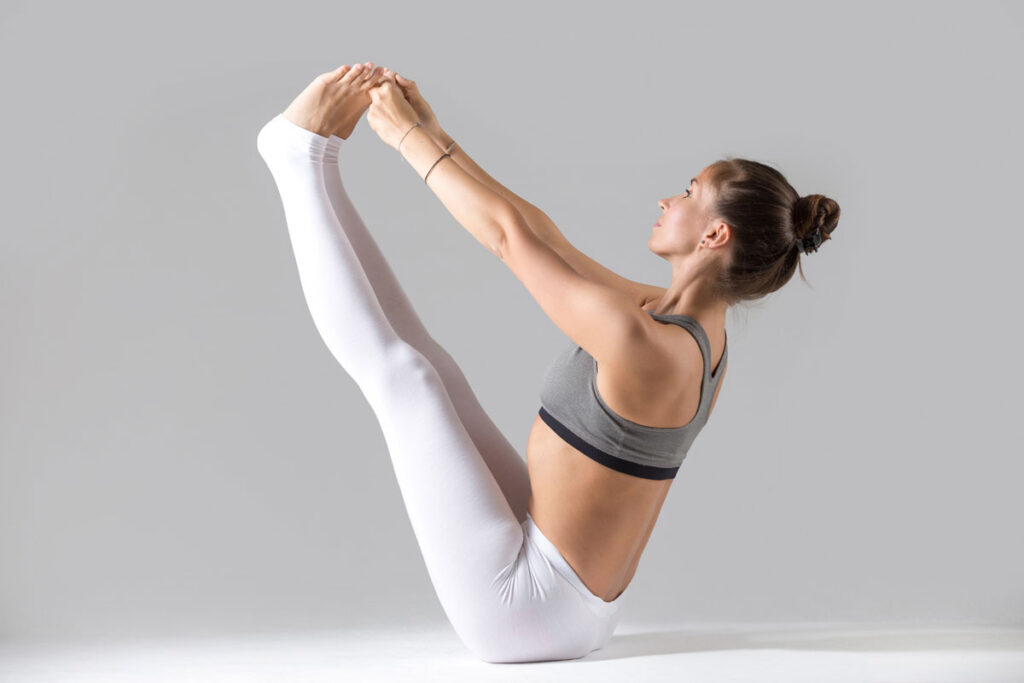
The Pilates Reformer is a piece of equipment that provides resistance using springs and pulleys, allowing for a wide range of exercises that can help improve posture, alignment, and core strength. The Reformer can be particularly helpful for people with back pain, as it allows for a wide range of exercises that can be modified to suit your individual needs and level of fitness.
Footwork: This exercise targets the leg and glute muscles while also engaging the core and promoting good posture. Lie down on the reformer with your feet on the footbar and your knees bent. Keeping your feet parallel, press the carriage away from the footbar, then bring it back in. Repeat for 8-10 repetitions.
Long Box Series: The Long Box series is a set of exercises that are performed while lying on the Pilates reformer’s long box. These exercises help to lengthen and strengthen the spine while also targeting the back and core muscles. One exercise in this series that can be particularly helpful for back pain is the “Pulling Straps” exercise. Begin by sitting on the box facing the footbar, holding the straps with your arms extended in front of you. Inhale as you pull the straps towards you, keeping your shoulders relaxed and your spine long. Exhale to release the straps and return to the starting position. Repeat for 8-10 repetitions.
Knee Stretch Series: This series of exercises targets the core and back muscles while also improving spinal mobility. Begin by kneeling on the carriage with your hands on the footbar. Inhale to prepare, and as you exhale, press the carriage out with your knees, keeping your shoulders over your wrists. Inhale to return to the starting position. Repeat for 8-10 repetitions.
Arm Circles: This exercise targets the shoulders and upper back muscles while also promoting good posture. Sit on the reformer with your legs extended in front of you and your arms extended out to the sides. Inhale as you circle your arms forward, bringing your hands together in front of you. Exhale as you circle your arms back behind you. Repeat for 8-10 repetitions.
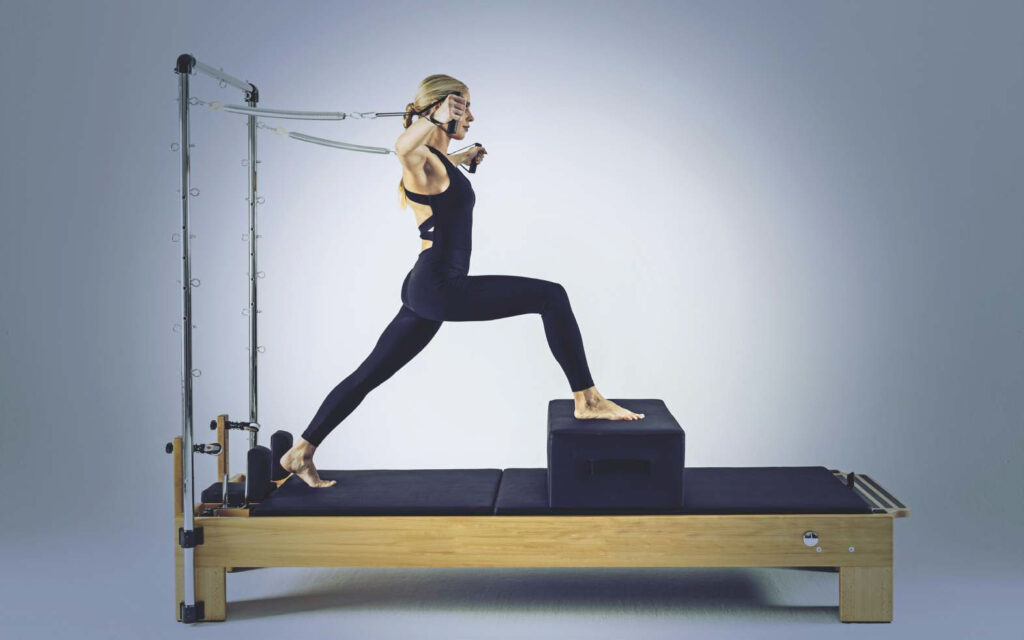
The Pilates reformer with tower vintage exercises that can also help alleviate back pain:
Leg Springs Series: This series targets the leg and glute muscles while also engaging the core and promoting good posture. Lie down on the reformer with your feet in the straps, then press your legs down towards the floor. Keeping your feet parallel, lift your legs back up to the starting position. Repeat for 8-10 repetitions.
Chest Expansion: This exercise helps to open up the chest and shoulders while also strengthening the upper back muscles. Begin by standing facing the tower, holding the straps with your arms extended in front of you. Inhale as you pull the straps towards you, keeping your shoulders relaxed and your spine long. Exhale to release the straps and return to the starting position. Repeat for 8-10 repetitions.
Back Rowing: This exercise targets the upper and mid-back muscles while also promoting good posture. Begin by standing facing the tower, holding the straps with your arms extended in front of you. Inhale as you pull the straps towards you, keeping your shoulders relaxed and your elbows close to your sides. Exhale to release the straps and return to the starting position. Repeat for 8-10 repetitions.
Arm Springs Series: This series targets the arms and upper back muscles while also promoting good posture. Lie down on the reformer with your arms extended out to the sides, holding the springs. Inhale as you reach your arms up towards the ceiling, keeping your shoulders relaxed and your spine long. Exhale to lower your arms back down to the starting position. Repeat for 8-10 repetitions.
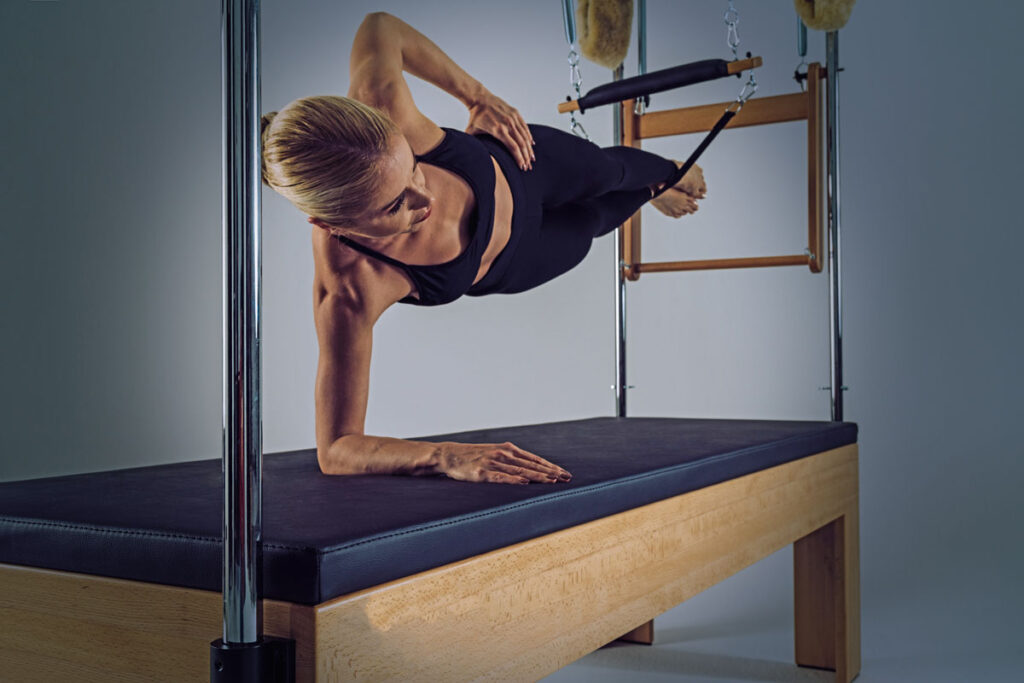
Pilates Cadillac, also known as the Trapeze Table, is a piece of equipment used in Pilates that allows for a wide range of exercises and movements. Here are some Pilates Cadillac Vintage exercises to release for back pain:
Roll Down: This exercise helps to stretch and mobilize the spine while also engaging the core muscles. Begin by standing facing the Cadillac, holding the overhead bar with your arms extended in front of you. Inhale as you roll down through your spine, keeping your knees slightly bent and your head and neck relaxed. Exhale to roll back up to the starting position. Repeat for 8-10 repetitions.
Push Through Bar: This exercise targets the chest, shoulders, and upper back muscles while also promoting good posture. Lie down on the Cadillac with your feet pressing against the foot bar and your arms holding the overhead bar. Inhale as you push the bar away from you, keeping your shoulders relaxed and your spine long. Exhale to release the bar and return to the starting position. Repeat for 8-10 repetitions.
Chest Expansion: This exercise helps to stretch and mobilize the chest, shoulders, and upper back muscles. Begin by sitting facing the Cadillac, holding the straps with your arms extended out in front of you. Inhale as you pull the straps towards your chest, keeping your shoulders relaxed and your spine long. Exhale to release the straps back to the starting position. Repeat for 8-10 repetitions.
Short Box Series: This series targets the core muscles while also promoting good posture. Sit on the box facing the Cadillac, holding the straps with your arms extended out in front of you. Inhale as you lift your chest and arms up, then exhale to twist your torso to the right, pulling the straps with you. Inhale to return to center, then exhale to twist to the left. Repeat for 8-10 repetitions on each side.
Flying Eagle: This exercise targets the upper back and shoulder muscles while also promoting good posture. Lie down on the Cadillac with your arms extended out to the sides, holding the straps. Inhale as you lift your arms up towards the ceiling, keeping your shoulders relaxed and your spine long. Exhale to lower your arms down towards your hips, twisting your palms to face forward. Inhale to lift your arms back up to the starting position. Repeat for 8-10 repetitions.
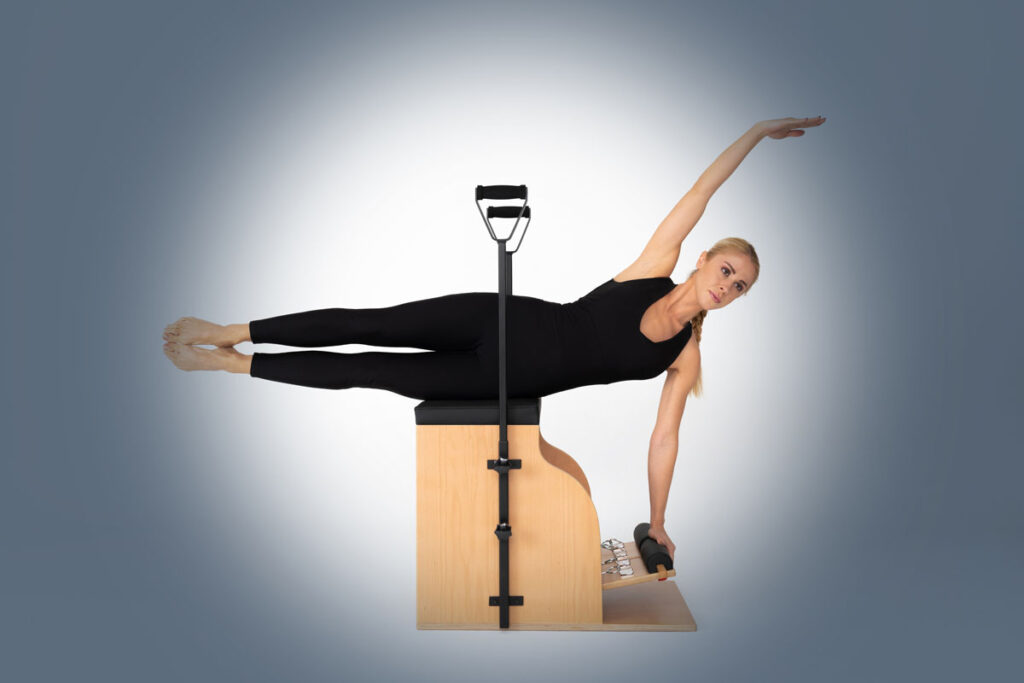
The Pilates Chair is a versatile piece of equipment that can be used for a variety of exercises, including those that can help alleviate back pain. Here are a few Pilates Chair Vintage exercises that can help with back pain:
Spine Stretch: This exercise helps to stretch and mobilize the spine, while also engaging the core muscles. Sit on the chair with your feet on the pedal, hands on the handles, and spine long. Inhale to prepare, then exhale to press down on the pedal, rounding your spine and lowering your head towards your knees. Inhale to release the pedal and return to the starting position. Repeat for 8-10 repetitions.
Swan: This exercise targets the upper back and shoulder muscles, helping to improve posture and alleviate pain in the upper back. Sit on the chair with your feet on the pedal, hands on the handles, and spine long. Inhale to lift your chest and arms up towards the ceiling, keeping your shoulders relaxed. Exhale to lower your chest and arms back down to the starting position. Repeat for 8-10 repetitions.
Teaser: This exercise targets the core muscles, while also promoting good posture and spinal alignment. Sit on the chair with your feet on the pedal, hands on the handles, and spine long. Inhale to prepare, then exhale to lift your legs and roll your spine back, balancing on your sit bones. Inhale to lower your spine and legs back down to the starting position. Repeat for 8-10 repetitions.
Mermaid: This exercise helps to stretch and mobilize the side body, while also promoting good posture and spinal alignment. Sit on the chair with one foot on the pedal, and the other leg extended out to the side. Inhale to lift your arm up towards the ceiling, keeping your shoulders relaxed and your spine long. Exhale to side bend towards the pedal, stretching the side of your body. Inhale to lift back up to the starting position. Repeat for 8-10 repetitions on each side.
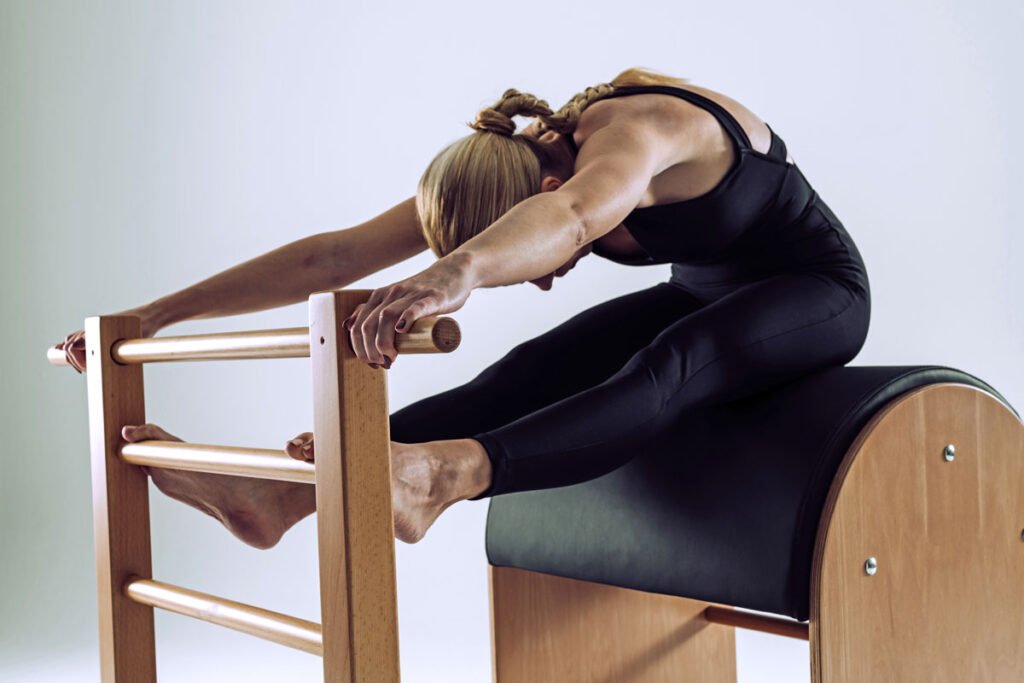
The Pilates ladder barrel is a piece of Pilates equipment that can be helpful for people with back pain. Here are a few Pilates ladder barrel vintage exercises that can help relieve back pain:
Spine Stretch: Sit on top of the barrel with your legs straight out in front of you and your feet flat on the floor. Place your hands on the barrel behind your head and slowly lower your head and shoulders down towards the barrel, keeping your back straight. Hold for a few seconds, then slowly return to the starting position.
Barrel Roll: Sit on top of the barrel with your knees bent and your feet flat on the floor. Place your hands on the barrel behind your head and slowly roll your spine down towards the barrel, one vertebra at a time, until your hips are resting on the barrel. Hold for a few seconds, then slowly roll back up to the starting position.
Mermaid Stretch: Sit on top of the barrel with your legs to one side and your knees bent. Place one hand on the barrel and reach the other hand up towards the ceiling. Inhale and lift your torso up and over the barrel, reaching towards the opposite side with your top hand. Exhale and return to the starting position. Repeat on the other side.
Swan Stretch: Lie face down over the barrel with your hands on the floor in front of you. Inhale and lift your chest up off the barrel, keeping your legs and pelvis on the barrel. Exhale and return to the starting position.
Seal Stretch: Sit on top of the barrel with your legs together and your feet flat on the floor. Reach your arms around your legs and grab onto your ankles. Inhale and roll back onto your shoulders, lifting your legs up towards the ceiling. Exhale and roll back up to the starting position.
These exercises focus on strengthening the core muscles, improving posture, and promoting spinal mobility and flexibility, which can help alleviate back pain. As with any exercise program, it is important to consult with a healthcare provider before beginning a new Pilates practice if you have any concerns or medical conditions. They can help you determine the appropriate exercises and modifications for your individual needs and level of fitness.
By Alison Parker

